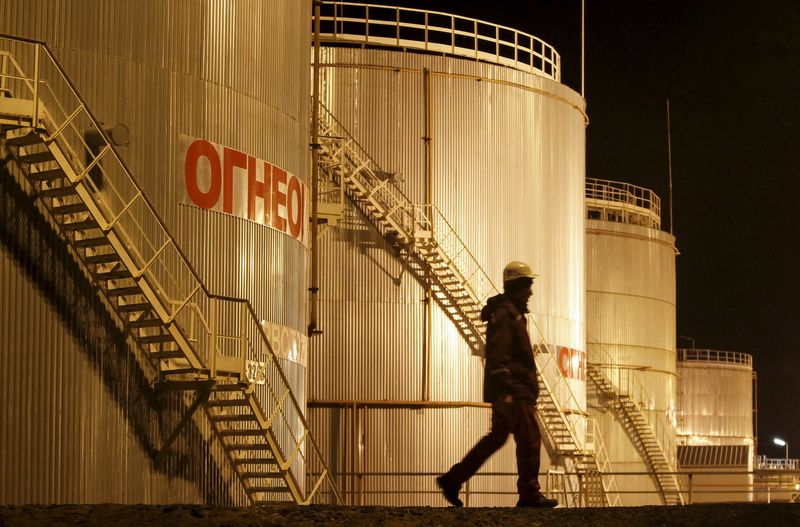(Reuters) - Russian crude oil exports to the European Union slipped to around 600,000 barrels per day (bpd) in January as seaborne volumes dried up except to Bulgaria, International Energy Agency (IEA) data shows.
The EU imposed a ban on maritime Russian crude oil imports from Dec. 5 and G7 countries set a price cap on Russian seaborne exports at $60 per barrel.
Bulgaria has secured a two-year exemption from the EU ban, imposed over Russia's full-scale invasion of Ukraine in February 2022.
Imports via the Druzhba pipeline are exempt from the EU ban as well, but its volumes dropped to 400,000 bpd in January as Germany voluntarily suspended imports at the end of 2022, the IEA said in its latest oil market report published on Feb. 15.
The Druzhba pipeline begins in Russia and then splits into one branch through Belarus and Poland to Germany, and another through Ukraine to Slovakia, the Czech Republic and Hungary.
Russia exported 1 million bpd of crude oil to the EU in December, according to IEA data.
RUSSIA REDIRECTS CRUDE EXPORTS TO ASIA
Russian crude exports to China rose by 300,000 bpd in January to a record high of around 2.3 million bpd, the IEA'S report showed.
Exports to Turkey rebounded from a December low of 40,000 bpd to 180,000 bpd in January, but were still well below the average of 350,000 bpd previously.
Exports to India, which increased imports of Russian crude significantly last year, were broadly steady at 1.6 million bpd.
Ghana and Indonesia emerged as new destinations for Russian crude exports in January, the IEA added.
HOW THE EU IS REPLACING RUSSIAN CRUDE IMPORTS
Total Russian crude oil exports to the EU, including seaborne exports, have fallen by 1.9 million bpd since last February.
The EU has been seeking to offset the decline in Russian imports by increasing supplies from the Middle East, West Africa, Norway, Brazil and Guyana, according to the IEA.
Germany planned to start importing crude oil from Kazakhstan via Druzhba's northern leg in February, but talks over the final details delayed the start.
Kazakhstan has requested Druzhba's operator Transneft to provide about 24,000 bpd of transport capacity for 2023.
In December, Norway increased production capacity at its Johan Sverdrup oilfield to 720,000 bpd from 535,000 bpd, and its operator Equinor is looking at the possibility of boosting it further to 755,000 bpd.
Sverdrup, Western Europe's largest oilfield, produces medium-heavy crude that is a suitable replacement for Russia's Urals.
Slovakia, which depends nearly 100% on crude oil imports via the Druzhba pipeline, plans to cut its dependence to around 60% this year.
Landlocked Hungary plans to cooperate with Croatia to increase the capacity of the Adriatic pipeline that brings non-Russian crude to Hungary, while Bulgaria is seeking to revive a pipeline project to import crude via Greece.
IMPACT ON EU REFINERIES
The EU's dependence on Russian crude oil imports had been underpinned by Russian companies, such as Rosneft and Lukoil, controlling some of the bloc's largest refineries.
Germany, however, has taken control of the Rosneft-owned Schwedt refinery, which supplies about 90% of Berlin's fuel needs, as well as Rosneft's minority stakes in two other refineries, MiRo and Bayernoil.
The government plans to change the laws to allow a quick sale of Rosneft's 54.17% stake in the Schwedt refinery without the need for prior nationalisation.
The refinery has been running at only 60% capacity with oil coming through the German port of Rostock. The German government is looking at ways to supply additional volumes via the Polish port of Gdansk.
Lukoil has agreed to sell its Italian ISAB refinery to a group led by Cypriot private equity firm G.O.I. Energy, backed by Geneva-based commodity trader Trafigura, but still owns refineries in Bulgaria and Romania.
Bulgaria's parliament has cleared the way for the government to take over Lukoil's Neftochim Burgas refinery, the largest in the country, to ensure security of supplies, if needed.
The EU also banned imports of Russian oil products, such as diesel, from Feb. 5.
